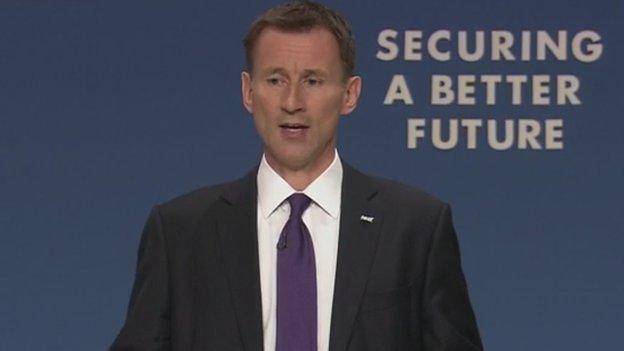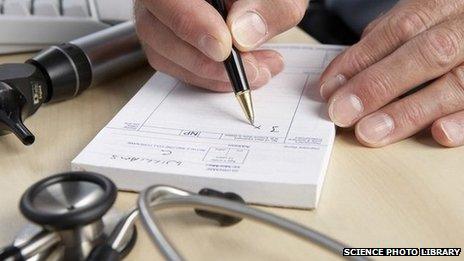David Cameron promises seven-day GP access by 2020
- Published
- comments
David Cameron on GPs: 'What we're doing is tried and tested'
Everyone in England will have access to GP services seven days a week by 2020, Prime Minister David Cameron has promised.
The government has also promised to bring back "named GPs" - to take charge of care outside hospital.
And Health Secretary Jeremy Hunt told the Conservative Party conference people would be able to access their medical records online by next April.
Labour accused the prime minister of "broken promises" on the NHS.
Mr Cameron said: "People need to be able to see their GP at a time that suits them and their family. That's why we will ensure everyone can see a GP seven days a week by 2020.
"We will also support thousands more GP practices to stay open longer - giving millions of patients better access to their doctor."
Skype consultations
Under a £50m pilot scheme launched at last year's Conservative conference, surgeries in nine areas of England were able to bid for money to open from 8am to 8pm seven days a week, as well as offering Skype consultations and more telephone consultations.

Jeremy Hunt said the NHS would be a Conservative government's top priority
Practices around the country will now be invited to bid for funds for 2015/16. Extending seven day opening to all areas by 2020 will cost £400m spread over the next five years, the government said.
Speaking on BBC Radio 4's Today programme, Mr Cameron said this was not "some fairytale announcement", saying the pilot scheme had been "a great success".
He said the move could take pressure off accident and emergency wards, which he said were "not the right place" for "frail, elderly" people.

Analysis: Nick Triggle, health correspondent

GPs are often referred to as the gateway to NHS care. It is easy to understand why - nine in every 10 patient contacts are at GP surgeries.
So it should come as no surprise that the state of services should be providing such an important battleground between the political parties in England.

"Yes, this costs money, but I actually think it will help take the pressure off a key part of the system," he said.
The British Medical Association has questioned whether extending opening hours is the best use of stretched NHS resources.
Dr Chaand Nagpaul, Chair of the BMA's GP committee, said the announcement did not address "the current reality".
He said: "We need immediate solutions to the extreme pressures that GP practices are facing, with inadequate numbers of GPs and practice staff to manage increasing volume of patients, who are already having to wait too long for care."
In his speech at the Conservative Party conference in Birmingham, Mr Hunt said the 8am until 8pm, seven-day service would be available to a quarter of the population next year before being rolled out nationwide by 2020.
A future Conservative government would "have no greater priority than to protect, support and invest in our NHS", he said.
'Poor care'
"It's not a Labour health service, or a Conservative health service, it's a National Health Service," he said.
Every surgery in England would have a named family doctor under the new GP contract, Mr Hunt said, and an extra 5,000 GPs would be trained in order to cope with the longer hours.
England would be the first country in the world to take the "huge step" of allowing people access to their online records, he said.
And he defended the use of independent providers in the health service, telling Labour to "stop scaremongering about privatisation" of the NHS.
Health Secretary Jeremy Hunt confirms 5,000 more GPs will be trained
Mr Hunt said Labour had not learned "the lessons of poor care" and criticised the party over the Mid-Staffordshire scandal.
Mid Staffordshire NHS Trust was criticised in a public inquiry headed by Robert Francis QC for causing the "suffering of hundreds of people" under its care between 2005 and 2008.
Labour has said it would plough an extra £2.5bn into the NHS, if it regains power, to hire an extra 8,000 GPs and to guarantee that everyone will be able to see a GP within 48 hours.
'Guaranteed appointment'
Shadow health secretary Andy Burnham said: "David Cameron made an almost identical announcement this time last year but, in the 12 months since, he has made it harder, not easier, to get a GP appointment.
"After the election, David Cameron scrapped Labour's GP appointment guarantee and cut support for evening and weekend opening. His broken promises on the NHS have caught up with him.
"Under David Cameron, it has got harder and harder to get a GP appointment. People are left ringing the surgery early in the morning only to be told nothing is available for days.
"The next Labour government will guarantee a GP appointment within 48 hours or a same-day consultation with a doctor or nurse for those who need it."
But Mr Cameron told BBC Breakfast the 48-hour guarantee was a "tried and failed" target because GP surgeries could not give patients an appointment later in the week which many people wanted.
"What we are doing is tried and tested. Seven days, 12-hours a day, good access to your GP," he said.
"That will be really welcomed by people with young children. I have had four children, one of them desperately ill. I know how important your family doctor service is."
Conservative MP and former GP Sarah Wollaston told BBC News achieving the longer hours in rural areas would be "far more of a challenge".
The Conservatives are using their week in Birmingham to announce a series of policies aimed at convincing voters the pain of austerity has been worth it, allowing them to deliver improvements to the NHS, pensions and housing.
On Tuesday, Home Secretary Theresa May unveiled a new counter-extremism strategy while conference favourite, London Mayor Boris Johnson, cheered activists by saying an election win "is within our grasp".
'Double battle'
But the party continues to be rocked by the threat of the UK Independence Party after the defection of a second Conservative MP.
Prime Minister David Cameron has rejected claims that the rise of UKIP risks a fundamental split in the right of UK politics but acknowledged that he was in a twin fight against Labour and Nigel Farage's party.
"I have a double battle on my hands," he told BBC's Newsnight.
"I have to win a blue-red fight against Labour... but I also have to win back people who have left my party who are concerned and worried about the pressures in our modern world.
David Cameron: "The deficit... is still a drag anchor on our economy"
"I have to reassure them I absolutely get the problems of uncontrolled immigration, I do want to change our relationship with Europe and build a sense of national pride that this country can again be a success in this modern world."
"I think a lot of those divisions on the right are about reassurance and understanding and going back to your values about what makes you tick rather a fundamental division which is what we have we Labour."